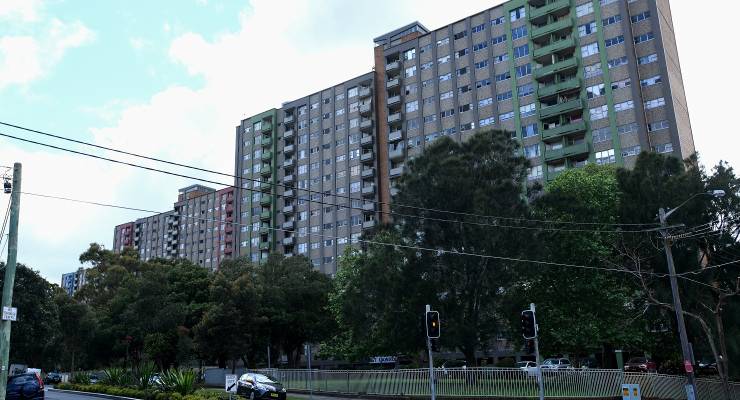
Housing has moved beyond many Australians’ reach because the government is subsidising the private market instead of building social housing, a new report has found.
Everybody’s Homes “Written Off” report shows the federal budget is expected to lose almost a quarter of a trillion dollars to negative gearing and capital gains tax concessions between 2010-33. It argues investor tax breaks over the next decade could build more than half a million social homes, and have outstripped spending on social housing by at least five times.
Further highlighting the disparity, the report says the government spent about $164 per person on public and community housing in 1982. By 2022, the number had shrunk to $61.
In response, the national campaign to fix Australia’s housing crisis has urged the federal government to scrap tax concessions for property investors and build more dwellings for lower-income Australians.
“In the midst of a major cost-of-living crisis, the federal government is spending record amounts on housing to line the pockets of investors,” campaign spokeswoman Maiy Azize said.
“That has made renting and buying homes more expensive than ever. Tax handouts for investors will be a quarter of a trillion dollar mistake if the government doesn’t change tack.”
Research by property data group CoreLogic reveals rents increased 8.3% in 2023, outstripping an 8.1% rise in house prices and eclipsing a 4% rise in wages.
Meanwhile, analysis by Ray White Group’s chief economist Nerida Conisbee revealed the cost of median-priced houses has increased by 78% over the past decade, while houses priced in the top 5% have doubled in cost.
Part of this is driven by a greater concentration of wealth which is often invested in luxury homes, Conisbee said.
The federal government has promised to reinvigorate the sluggish home-building sector, pledging to deliver 1.2 million new dwellings over five years.
A major piece in the housing puzzle was set in place last week, with applications opening for the government’s Housing Australia Future Fund.
Housing Minister Julie Collins said the fund, along with the National Housing Accord, would deliver 40,000 social and affordable rentals in its first five years.
Over the longer term, Written Off argues Australia should aim for a target of at least 10% of all housing stock to be social housing.








Shorten had a crack at killing off the negative gearing scam but voters reacted by returning the should’ve-been-unelectable Scott Morrison.
… If only our Little Pigs Inc could have built houses from that pile of DIY amputated noses.
Albanese dumped the policy after one go around and haemorrhaged votes to Greens and Teals.
@zut and @banquo – Shorten lost in 2019 because he pushed too much. He should have kept NG/CGT reform but left the cash rebate for franking credits alone. Yes they’re a rort and it’s unfair that people pay negative income tax. But Labor nearly won in 2016, but did an Icarus and got burned in 2019.
Labor should bring back the 2016 platform in 2025
The existence of a franking credit means tax has been paid. Refusing to recognise that for the lowest paid retirees while continuing it for the better off was a recipe for disaster.
Albo needs to restore Shorten’s policy of allowing negative gearing on new builds only, and reducing cgt to what it was before Howard fiddled with it and wrecked housing affordability pretty much single handedly.
Shorten lost because Crosby Textor were engaged in some dark arts stuff that had helped deliver Brexit and Trump.
Biden (and a few mainstream parties in Europe) figured out a way to counter it.
Unfortunately the narrative (pushed by the same interests) is that Shorten lost the election for policy reasons.
It’s a bit like the narrative around the so called carbon tax.
These are all designed to shift the Overton window so that otherwise sensible, mainstream policies are seen as impossible.
The real genius of the carbon tax lie was that it make it impossible to ever introduce a carbon tax.
I’d never previously considered the policy of killing off neg gearing and negative taxation via franking credits as not a major part of the 2019 loss, but maybe it is overly weighted.
I still think it was nuts not to grandfather the franking credit changes – shifting the goal posts on retirees post their retirement is going to put the wind up a lot of 50+ voters – but with Clive and newscorpse spreading poison, and Scummo effectively being a cleanskin at the time, maybe that was all it took if you added that to Shorten’s inherent unelectablity.
What you say is well worth taking on board.
With massive support from MSM
Including the AWBC, it enthusiastically joined the ‘Kill Bill’ movement, mostly by echoing the Murdochs’ ‘journalists’.
Labor are such wimps. They seem to be mainly concerned to never upset anyone, ever, so that they get re-elected, rather than doing what is right, even if it means treading on a few toes.
It’s the small target strategy – you get less criticism for not doing something than you do for doing something.
They are upsetting plenty of people. And they may only realise it after the next election.
The only hope for this country is minority ‘Labor’ government with a strong crossbench of Green, Indi & Teal in both Chambers.
They are upsetting me by their inaction. Surely I am not alone.
Yes, including me an ALP member (at the moment) of 34 years!! I’m very disappointed by the lost opportunities to actually do the things that need doing. While not everything can be done at once, ALBO & Co needed to prioritize and pick their battles. Seems like The Voice was #1!! I’m also amazed at the ALP’s poor political strategy of clinging to a 6 year old Scomo/LNP ideological policy ( Stage 3 Tax Cuts), when the chance to modify/improve now presents itself. A Labor ( so called) Government will implement an old Liberal policy- that’s just dumb!
Silly thing is, they seldom get re-elected unless they actually do something bold(er). Sometimes I think Labor prefers to be in opposition so they don’t have to make any decisions other than saying yes to dumb LibNat bills.
The way they are travelling, it’s a case of IF they get re-elected.
As Crikey’s very own GR puts it, if Labor aren’t prepared to put up (and defend) Labor-style policies, what is the point of a Labor Government?
Yes Dutton would be dreadful, but this slow slow slow moving of the pendulum forward (and only in some policy areas) is utterly tiresome.
Surely John Howard deserved a call out?
The Rodent somehow continues to evade any responsibility for the havoc he created.
Honest John and Piddlin’ Pete, the hand that signed-off on the cheques with no balances.
Labor has held government for long enough since then to have done literally anything to remedy Howard’s mess. Almost 10 years themselves. talk about a lost decade. They’ve chosen not too.
Why pick on one individual? Every relevant government minister in the last few decades has contributed to this. It’s fair enough that the article summarises the problem without getting distracted by trying to sort out the relative degrees of personal responsibility of particular members of previous governments.
Agreed. Serious movement on this won’t come from Lib or Lab. We desperately need a minority Labor govt – the more minority the better.
That’s because even lots of Teal and Labor voters probably still consider him the best PM in living memory.
No. Most of the Teals are there because they were potential Liberals who rejected Howard/Abbott/Morrison policy.
Agreed. The Teals represent the more liberal elements of the party Menzies set up as a combination of liberal and conservative, and which have been increasingly disenchanted or repulsed by the reactionary far right-wing takeover which was led by Howard. The Liberal Party endlessly bangs on about Menzies’ legacy and being a ‘broad church’, but the emergence of the Teals outside the Liberal Party proves those days are over.
While I agree Howard led to Abbot and Morrison, the genesis of the Teals is clearly in their [Abbot & Morrison] turn away from Howard’s basic pragmatism and embracing US-style “pwn the libs” identity politics that exists for little reason other than the get the right into power, or wreck the joint (or both).
I guarantee you a sizeable chunk of Teal voters would have been happily voting for Howard’s Liberals, even in his last years.
You all have forgotten the “doctors wives” insults, and the disparagement of decency under Howard. That was the genesis of the Teals.
…said campaign spokeswoman Maiy Azize. But would it be a mistake? All governments for decades have not had any housing policy — that would be a policy to ensure all Australian residents have somewhere they can afford to live — although at times there are token and half-hearted gestures in that direction. Instead the governments have all ruthlessly pursued ‘keep house prices rising’ policies, with remarkable success. There’s no mistake. And there’s no sign the major parties are going to change.
But the Coalition have had twice as long in government than Labor since WW2 and pigs will fly before the Coalition even contemplates taking away the middle class largesse it has shoveled out during its time in government.
Given that both major parties have near enough the same policies in government, it makes little or no difference which has been in power longer. Trying to blame one and not the other is pointless.
And there’s no sign the major parties are going to change.
That’s because so much of the economy is dependent on rising property prices.
Your typical small business, for example, is going to be financed by a loan against the owners home.
Lots of consumption is paid for through accessing “equity mate” from rising house prices.
The Australian economy could be succinctly described as people selling coffee or lending money to other people swapping houses and digging up rocks. There’s not a lot of “value-add” going on.
Yes, not exactly uplifting, but that is the current state of play. Well put.
Ha ha so true.
You see we agree on some stuff.
Well put. That is it in a nutshell. Governments believe they’ll lose power if they offend any of those three sectors of the ‘GDP-driven’ economy. The tendency is exacerbated by our too-short parliamentary terms, in which a government has insufficient time to ‘seed’ in the electorate any alternative ideas, if they have any.
Here in Western Australia, we are spending crazy amounts of money on public transport infrastructure, but the way I see it very little on public housing, nurses, prison officers, paramedics, police, and teachers. As Pauline would say PLEASE EXPLAIN
A quarter of a trillion dollars going to the have-mores, rather than the have-less. But that’s democracy, sort of. As long as the majority will continue to vote to keep their concessions and rorts, then those struggling will see their taxes go to support those profiting. Anyone for a riot?
It’s the ‘short-form democracy’ where a majority elect a government to ignore the most fundamental interests of a very large percentage of the electorate, maybe the majority of the electorate. In the ‘short-form’, in which mis- and disinformation is very prevalent, many of the have-less also vote against their own interests.